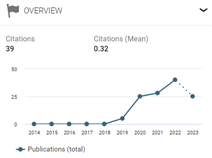Kadar glukosa darah pada wanita menopause: Studi di Puskesmas Muara Dua Kota Lhokseumawe
DOI: 10.30867/gikes.v6i2.1740Abstract
Background: Type 2 Diabetes Mellitus (T2DM) is a chronic metabolic disease with increasing prevalence among middle-aged and older women, particularly during menopause, when estrogen decline can trigger insulin resistance and visceral fat accumulation. Local data on blood glucose profiles in postmenopausal women at the primary care level remain limited.
Objectives: To describe blood glucose levels among menopausal women attending Puskesmas Muara Dua, Lhokseumawe.
Methods: This descriptive quantitative study involved all menopausal women visiting Puskesmas Muara Dua Laboratory between February 6–17, 2023 (n=27, total sampling). Capillary blood glucose was measured using the EasyTouch GCU device via POCT method. Blood glucose levels were classified as normal (<140 mg/dL, postprandial) or abnormal (≥140 mg/dL) following WHO/ADA standards. Data were analyzed descriptively as frequencies and percentages.
Results: Of the 27 participants, 59,3% had abnormal blood glucose (≥140 mg/dL). The highest proportion of abnormal values occurred in the 50–59 age group (71,4%; mean 228,0 mg/dL), followed by 60–69 years (55,6%; mean 179,,7 mg/dL), and 70–79 years (25,0%; mean 142,5 mg/dL). Moderate to severe hyperglycemia (201–300+ mg/dL) was observed in 13 respondents (48,1%), indicating substantial risk for diabetic complications.
Conclusion: A majority of menopausal women in this study exhibited abnormal blood glucose, with the highest prevalence in the early postmenopausal age group. Regular screening, lifestyle modification counseling, and prompt medical follow-up are crucial to prevent T2DM-related complications in this population.
Keywords
Full Text:
PDFReferences
Al-Sharafi, B. A., & Odhaib, S. A. (2025). Optimizing hormone replacement therapy for postmenopausal women with type 2 diabetes: a review. Exploration of Endocrine and Metabolic Diseases, 2, 101430. https://doi.org/10.37349/eemd.2025.101430
Chikwati, R. P., Chikowore, T., Mahyoodeen, N. G., Jaff, N. G., George, J. A., & Crowther, N. J. (2024). The association of menopause with cardiometabolic disease risk factors in low- and middle-income countries: a systematic review and meta-analyses. Menopause (New York, N.Y.), 31(1), 77–85. https://doi.org/10.1097/GME.0000000000002292
Choi, M. J., & Yu, J. (2025). Menopause and Diabetes Risk Along with Trajectory of β-Cell Function and Insulin Sensitivity: A Community-Based Cohort Study. Healthcare (Basel, Switzerland), 13(9), 1062. https://doi.org/10.3390/healthcare13091062
Colberg, S. R., Sigal, R. J., Yardley, J. E., Riddell, M. C., Dunstan, D. W., Dempsey, P. C., Horton, E. S., Castorino, K., & Tate, D. F. (2016). Physical activity/exercise and diabetes: a position statement of the American Diabetes Association. Diabetes Care, 39(11), 2065–2079. https://doi.org/10.2337/dc16-1728
Dinkes Lhokseumawe. (2023). Laporan Tahunan Puskesmas Muara Dua 2022.
Dunlop, K., Dillon, G., Crowley, R. K., Phillips, C., Twomey, P., & McAuliffe, F. M. (2025). Lifestyle interventions in later reproductive age women to offset cardiometabolic and bone disease: a scoping review. Nutrition & Metabolism, 22(1), 15. https://doi.org/10.1186/s12986-025-00908-1
Genazzani, A. D., Petrillo, T., Semprini, E., Aio, C., Foschi, M., Ambrosetti, F., Sponzilli, A., Ricciardiello, F., & Battipaglia, C. (2024). Metabolic syndrome, insulin resistance and menopause: the changes in body structure and the therapeutic approach. Gynecol Reprod Endocrinol Metab, 4(2), 86–91. https://doi.org/0.53260/grem.234026
Huang, D. R., Goodship, A., Webber, I., Alaa, A., Sasco, E. R., Hayhoe, B., & El-Osta, A. (2023). Experience and severity of menopause symptoms and effects on health-seeking behaviours: a cross-sectional online survey of community dwelling adults in the United Kingdom. BMC Women’s Health, 23(1), 373. https://doi.org/10.1186/s12905-023-02506-w
Paschou, S. A., Athanasiadou, K. I., & Papanas, N. (2024). Menopausal hormone therapy in women with type 2 diabetes mellitus: an updated review. Diabetes Therapy, 15(4), 741–748. https://doi.org/10.1007/s13300-024-01546-1
Ukke, G. G., Boyle, J. A., Reja, A., Lee, W. K., Chen, M., Ko, M. S., Alycia, C., Kwon, J., & Lim, S. (2023). Lifestyle interventions to prevent type 2 diabetes in women with a history of gestational diabetes: a systematic review and meta-analysis through the lens of health equity. In Nutrients (Vol. 15, Issue 21). https://doi.org/10.3390/nu15214666
Varalakshmi, D., Rekha, K., & Mohammed, R. (2024). Type 2 diabetes mellitus prevalence and associated risk factors in postmenopausal women. Cureus, 16(5), e60247. https://doi.org/10.7759/cureus.60247
WHO. (2015). Promoting mental health. Concepts, emerging evidence, practice. https://iris.who.int/bitstream/handle/10665/43286/9241562943_eng.pdf?sequence=1
Yuk, J.-S., Kim, G. S., Byun, Y. S., Yang, S.-W., Kim, M.-H., Yoon, S.-H., Seo, Y.-S., & Kim, B. G. (2024). Effect of menopausal hormonal therapy on cardiovascular risks in Korean postmenopausal women: A nationwide cohort study. BJOG: An International Journal of Obstetrics & Gynaecology, 131(9), 1306–1317.
https://doi.org/https://doi.org/10.1111/1471-0528.17803
Refbacks
- There are currently no refbacks.














